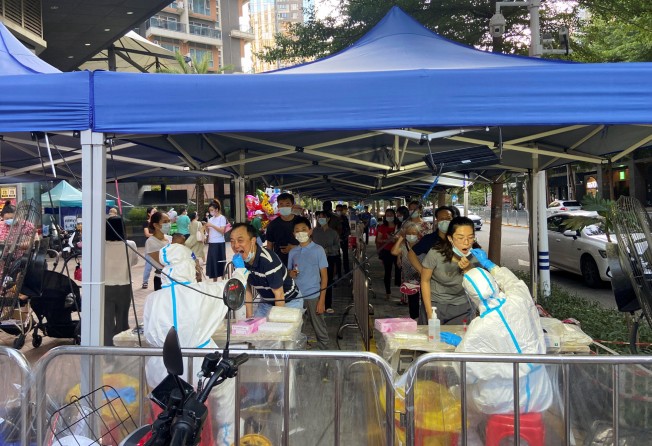
Chinese manufacturers in Shenzhen, including Huawei and SMIC, go under ‘closed-loop’ operating mode amid Omicron outbreak
- A Shenzhen government directive has advised major Chinese manufacturers to go on closed-loop operating mode, which restricts employee movement
- The closed-loop system remains the go-to strategy for mainland factories to keep production on track, while reducing the risk of new infections

Major Chinese manufacturing enterprises in Shenzhen, including Huawei Technologies Co, Semiconductor Manufacturing International Corp (SMIC) and drone maker DJI, have been advised to go under a “closed-loop” production system that restricts movement of employees, according to industry sources with knowledge of the local government directive.
The initiative, which started on Sunday and concludes after seven days, comes as the southern Chinese tech hub doubles its efforts to stave off a fresh outbreak of Covid-19’s Omicron variant, which has made the city’s residents wary of heightened control measures.
The Shenzhen government has also ordered these large firms, including telecommunications equipment maker ZTE Corp, manufacturing conglomerate BYD and Apple supplier Foxconn Technology Group, to lock up their gates and limit entry of visitors, according to the sources, who declined to be named because the government directive has not been made public.
The directive also covers China National Offshore Oil Corp, medical devices maker Mindray and others ranked in the city’s top 100 industrial firms, the sources said.

The move to a closed-loop operation mode, which involves control measures such as locking workers within a compound and conducting daily nucleic acid testing, remains the go-to strategy for mainland factories to keep production on track, while reducing the risk of spreading the coronavirus.
Taiwanese electronics contract manufacturer Foxconn, formally known as Hon Hai Precision Industry, continued operating under a closed-loop system in March. That followed a two-day suspension when Shenzhen, a major production and export base for Chinese hardware, went under a citywide lockdown.
The closed-loop production strategy is only allowed on manufacturing campuses that have both employee housing and production facilities. When rigid lockdowns were enforced in Shanghai in April and May, Tesla’s Gigafactory south of the city resumed some production under a closed-loop system approved by authorities.
Foxconn, which is Apple’s main supplier of iPhones, said in a statement on Monday that operations are normal at its two campuses in Shenzhen. The company also said it is following government instructions to keep a balance between Covid-19 control and “safe production”.
Huawei, the world’s largest telecoms gear maker, and Chinese chip foundry SMIC did not immediately respond to requests for comment on Monday. ZTE declined to comment.
Shenzhen reported 21 new local infections on Sunday, up from 19 a day earlier. While that number is low by international standards or in comparison with neighbouring Hong Kong, the local government has significantly tightened control measures, including mass testing and closure of public venues. Shenzhen has also not published any policies regarding the operations of industrial firms.